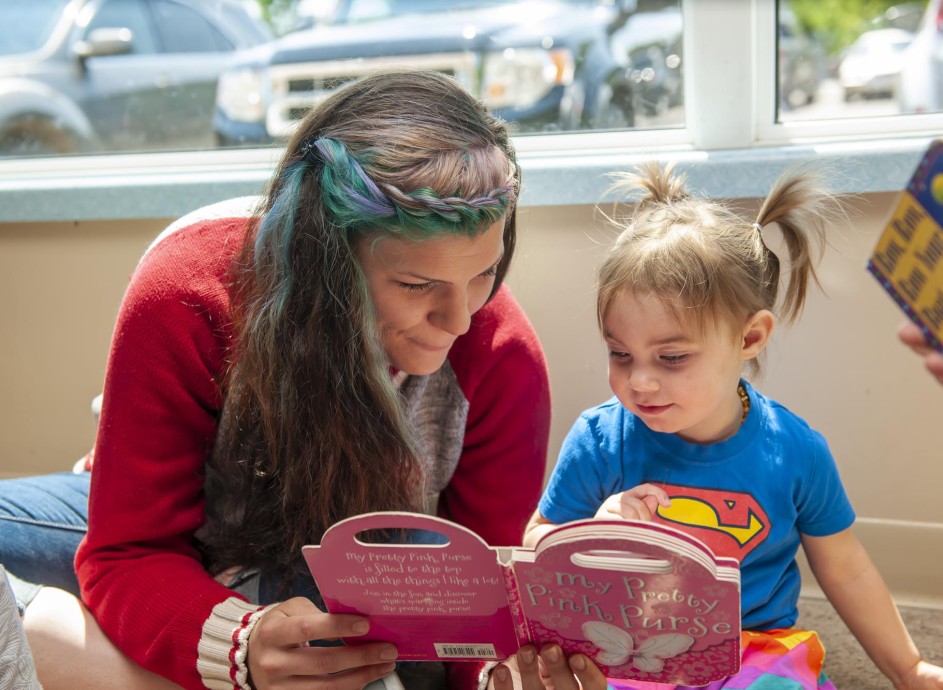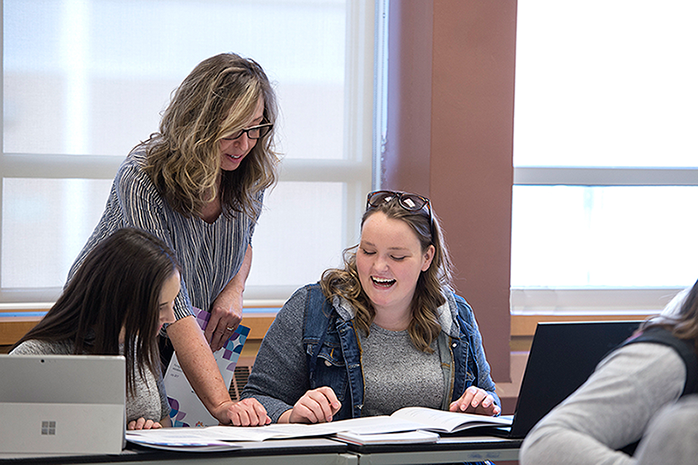
Program Overview
Program Details
Your Learning Experience
The Early Childhood Education (Fast Track - Online) program is designed for students who want to go from the classroom to a career in a short time and need the flexibility of online learning. This means no scheduled classes. In just one year, you will experience a unique blend of theory and coursework, with real experience in the field. This ECE (Fast Track) program will develop students' knowledge and professional skills in the early childhood educator's role and responsibilities, the importance of play in children's learning, family involvement and curriculum design and pedagogy. Your practicum will expose you to a wide variety of age groups and multiple organizations, providing dynamic and eclectic experiences that will make you more valuable to the field of early childhood education.
When the you graduate you will have the knowledge and necessary skills to work with children, families and community in the context of early learning and development programs for children from birth to age twelve. You will also be prepared to work in a variety of settings, including child care centres, early learning and family centres, before and after school programs as well as in kindergarten programs.
Certifications and Pathway Opportunities
- Students are required upon graduation and prior to working as an Early Childhood Educator to join the College of Early Childhood Educators
- Certification by the Association for Early Childhood Educators, Ontario may be applied for after completion of the program. The certification process involves the completion of a personal profile and the successful completion of a certification examination.
- Students who graduate from this program and wish to transfer to another Community Studies program at Fanshawe College may qualify for some internal credits that have already been achieved.
- Graduates of this program, once they have completed a bridge program, can enter into Level 5 of the Honours Bachelor of Early Childhood Leadership Degree program at Fanshawe College.
Career Information
Graduates of Fanshawe’s Early Childhood Education program will have the knowledge and skills to work with children, families and the community in the context of early learning and development programs for children from birth to 12 years of age. Graduates will be prepared to find employment in a variety of early childhood settings, including:
- child care centres
- early learning and parenting centres,
- best start programs
- nursery schools
- pre-kindergarten and kindergartens
- social and family centres
- before and after school programs
- community centres
- hospital playrooms
- centres or programs for children with exceptionalities
- school boards
Did you know Fanshawe consistently ranks high in graduation employment rates among large colleges in Ontario?
Here are some examples of career opportunities for graduates of Fanshawe’s Early Childhood Education (Fast Track) (Online) program:
Early Childhood Educator
Deliver enthusiastic and passionate support working with children aged 3 months to four years in a child care centre.
Early Childhood Education Centre Supervisor
Recruit, supervise, mentor and motivate staff to develop and deliver quality curriculum in a classroom setting.
Early Childhood Educator
Plan and implement a child care program while building relationships with families, children and community agencies.
Learning Outcomes
The graduate has reliably demonstrated the ability to:
- Create learning contexts to enable, build and maintain caring, responsive relationships in partnerships with children, families and communities that value and respect social, cultural and linguistic diversity including Indigenous peoples’ worldviews and Francophone identity;
- Co-create, facilitate and reflect upon inquiry and play-based early years and child care programs and pedagogical approaches to support children’s learning, holistic development and well-being following children’s capabilities, interests, ideas and experiences;
- Co-design and maintain inclusive early learning environments to value and support equitable, accessible and meaningful learning opportunities for all children, their families and communities in a range of early years and child care settings;
- Collaborate with children, families, colleagues, agencies and community partners to create, maintain, evaluate and promote safe and healthy early learning environments to support independence, reasonable risk-taking and healthy development and well-being;
- Use observation strategies to identify children’s strengths and challenges and to ascertain when children and families might benefit from additional support or community resources;
- Use professional communication in interactions with children, families, colleagues, employers, the regulatory body, government authorities and children’s service agencies to meet legal and ethical standards of the early years sector;
- Act in accordance with relevant legislation, regulations, College of Early Childhood Educators Code of Ethics and Standards of Practice, agency policies and procedures and principles of evidence-informed practice and reflect upon their impact on one’s own role in early years and child care settings;
- Identify, report and document when a child is in a situation of perceived risk for, or actual neglect or abuse, in accordance with legislation, the College of Early Childhood Educators Code of Ethics and Standards of Practice, policies and procedures;
- Create and engage in partnerships with families, communities, colleagues, interdisciplinary professionals, authorities and child service agencies to advocate for quality early years and child care programs and services;
- Engage in reflective practice and continuous professional learning in accordance with principles of lifelong learning, evidence-informed practices in the early years sector and requirements of the College of Early Childhood Educators.
Academic School
Program Coordinator:
Sheryl Third
Field Coordinator:
Kim Woods
Admission Requirements
ONE OF:
- An Ontario College Diploma in Community Studies
- A University Degree in Social Sciences
- A combination of relevant education and work experience in a related field as judged by the College to be equivalent to the above
Note:
Graduates of this program may choose to transfer into level 5 of the Honours Bachelor of Early Childhood Leadership Degree program after completing the bridging requirements.
International Admission Equivalencies
English Language Requirements
English Language Requirements
Applicants whose first language is not English will be required to demonstrate proficiency in English by one of the following methods:
- A Grade 12 College Stream or University Stream English credit from an Ontario Secondary School, or equivalent, depending on the program's Admission Requirements
- Test of English as a Foreign Language (TOEFL) test with a minimum score of 79 for the Internet-based test (iBT), with test results within the last two years
- International English Language Testing System (IELTS) Academic test with an overall score of 6.0 with no score less than 5.5 in any of the four bands, with test results within the last two years. SDS Program Requirements.
- Canadian Academic English Language (CAEL) test with an overall score of 60 with no score less than 50 in any of the four bands, with test results within the last two years
- Pearson Test of English Academic (PTE) with a minimum score of 53, with test results within the last two years
- A Cambridge English Test (FCE/CAE/CPE) with an overall score on the Cambridge English Scale of 169 with no language skill less than 162, with test results within the last two years
- Fanshawe College ESL4/GAP5 students: Minimum grade of 80% in ESL4/GAP5 Level 8, 75% in ESL4/GAP5 Level 9, or 70% in ESL4/GAP5 Level 10
Applicant Selection Criteria
Applicant Selection Criteria
Where the number of eligible applicants exceeds the available spaces in the program, the Applicant Selection Criteria will be:
- Preference for Permanent Residents of Ontario
- Receipt of Application by February 1st (After this date, Fanshawe College will consider applicants on a first-come, first-served basis until the program is full)
- Achievement in the Admission Requirements
Post-Admission Requirements
Post-Admission Requirements
The following items are applicable to the program:
- Possession of a Standard First Aid course certificate (either St. John Ambulance or Canadian Red Cross or equivalent) and a Basic Rescuer course certificate (Level "C" CPR)
- Evidence of Good Health
- Police Record Check and Vulnerable Sector Screening, including a check of the Pardoned Sexual Offenders Database
- Placement Agreement
(London Campus)
Courses
| Level 2 | ||||
| ECED-1084 | Foundations of ECE | 3 | ||
This course provides an introduction to the foundations and principles of early childhood education. It identifies the importance of a play based pedagogical approach to 'How Does Learning Happen?' Students will examine the role of the Early Childhood Educator in maintaining an inclusive, child centered and developmentally appropriate practice. | ||||
| ECED-1005 | Health Safety & Nutrition in ECE | 2 | ||
This course will identify components of a safe and healthy environment which meets the requirements of current legislation and regulatory bodies. The nutritional and health needs of young children are identified, and the implementation of appropriate environments and practices are discussed. | ||||
| ECED-1075 | Child Development: 0-3 Years | 3 | ||
In this course students will explore theories of child development that inform pedagogy and practice prenatal through the first three years of life. Brain structure and function during this critical period of development will be analyzed. Sensitive and responsive interaction strategies and their connection to belonging, well-being, engagement and expression of the young child will be explored. The implications of temperament and attachment in the early years will be appraised. | ||||
| ECED-1053 | Promoting Pro-Social Behaviour | 3 | ||
This course explores the need for Early Childhood Educators to establish relationships, support play and foster children's acceptance within the peer group. It examines strategies for creating an environment and curriculum that enhance positive peer interactions and pro-social behaviour. Based on research in resilience, this course identifies risk and protective factors affecting emotional development, and impacting behaviour in early childhood settings. Students explore specific strategies for Early Childhood Educators to promote resilience in children at risk. | ||||
| ECED-1076 | Curriculum & Pedagogy: 0-3 Years | 3 | ||
This course examines the critical role of the early childhood educator in creating caring and responsive relationships with children zero-three, their families, and communities. This course focuses on children's holistic development and wellbeing by understanding and responding to children's unique, capabilities, interests, and experiences through the integration of the principles from 'How Does Learning Happen?' Students will have opportunities to collaborate and facilitate observation-based inquiry and play-based early learning experiences using pedagogical documents*. As this course is focused on understanding and responding to infant and toddler development, emphasis is placed on the use of open-ended materials that scaffold learning and support investigation, creativity, reasonable risk taking and problem-solving. *ELECT, How Does Learning Happen?, Indigenous Early Learning and Child Care Framework | ||||
Tuition Summary
Online
*Total program costs are approximate, subject to change and do not include the health and dental plan fee, bus pass fee or program general expenses.







